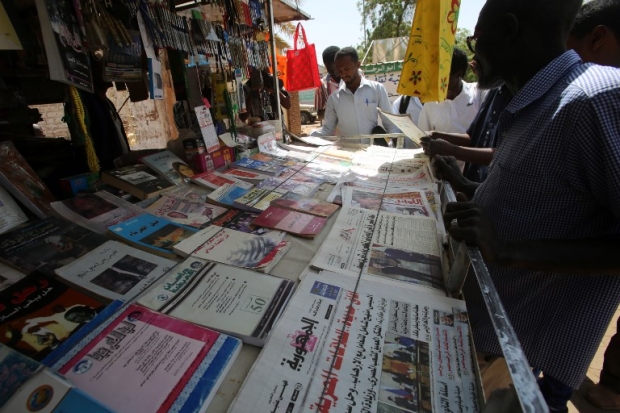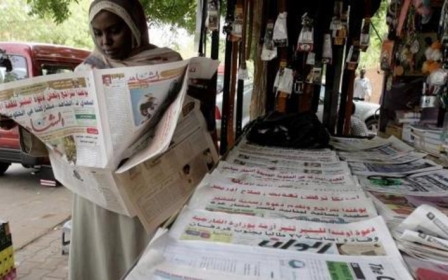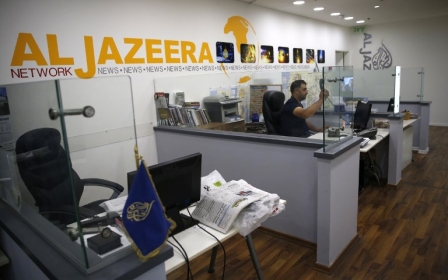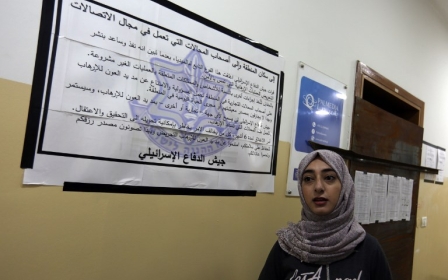The battle for existence among Sudan's journalists
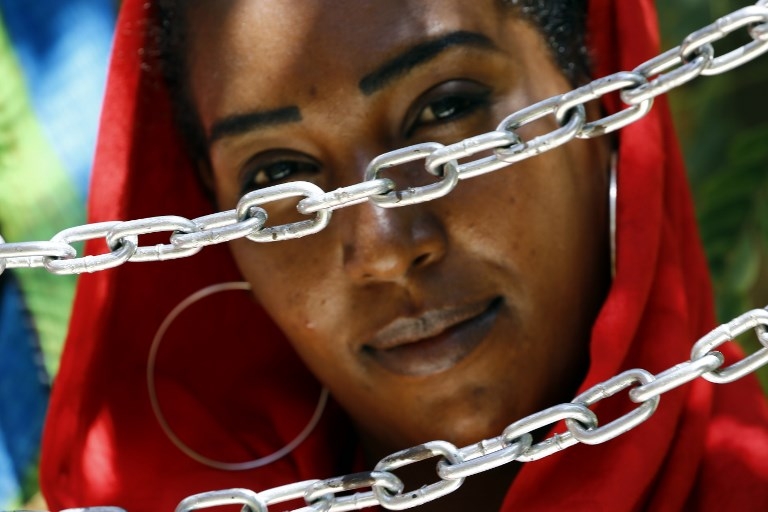
KHARTOUM - In a country already renowned for its lack of press freedom, the Sudanese journalist community is decrying a draft law set to curtail their work even further.
On Wednesday, two journalists were detained for a few hours after staging a protest outside the Sudanese Press and Publication Council, a government body staffed with politicians and members of the pro-government journalists' union.
Journalists say the new law, if it is passed, will put the nail in the coffin for any remaining press freedom in the country, increasing the government's powers to suspend newspapers, confiscate issues and even close down offices.
At the protest on Wednesday, journalists chanted that it had now reached a question of “to be or not to be” when it comes to press freedom in the country, and shouted “free journalism or no freedom”.
But security forces were quick to respond, detaining prominent journalist Shamail Alnur, intimidating protesters, and preventing them from turning the protest into a permanent sit-in. No reason was given for Alnur's detention.
Worsening restrictions
The Sudanese cabinet is currently discussing the draft media law, which contains wide amendments to the previous version, from 2009.
Journalists were already dissatisfied with the existing law, which was designed in accordance with the interim constitution, itself laid out by the comprehensive peace agreement of 2005.
The new law will add even greater restrictions upon the industry, especially those working online, journalists say.
One of the most controversial items is the power it would give to the Press and Publication Council to suspend publications for 15 days, in addition to banning journalists whose work has offended the government from writing.
It would also make it harder for journalists to acquire work permits, and similarly for publications to gain the correct permissions to operate, granted by the Press and Publication Council.
Media watchdog the Sudanese Journalists Network (SJN) has raised its concerns with the Sudanese Press and Publication Council, and criticised the proposed amendments.
They highlighted the importance of not veering from the press charter of honour, agreed upon between the Sudanese journalists and the government to regulate the institutional and individual relations of the media.
Worst version
Talking to MEE, SJN secretary general Adel Ibrahim described the current draft as the worst in the history of the Sudanese media.
“The press in Sudan is witnessing a series of deteriorations as the entire political environment in the country is worsening,” Ibrahim said.
“The government is replacing the 2009 law - which was already worse than the highly restrictive 2004 law - with an even worse 2017 version,” he said.
He added that the law is punitive and undermines the main role of the press – the gathering and distribution of information.
We will not give up. We will continue standing against the oppressive law
- Khalid Fathi, SJN chairman
And SJN chairman, journalist Khalid Fathi, warned that the watchdog’s members would continue protesting until the draft law was scrapped.
“We will not give up. We will continue standing against the oppressive law,” he told MEE.
International award-winning journalist Faisal Mohamed Salih said the law is outdated, and that, if passed, it would be one of the worst media laws in the world.
“These laws have been enforced intentionally in order to pave the way for the domination of one party over the entire country, rejecting any other voices,” he said.
“These actions will put the government, which is already struggling to convince the international community that it has abandoned its behaviour of oppressing its people, strictly in the corner of a lying regime,” he added.
'Protecting national interests'
The secretary-general of the Sudanese Press and Publication Council – which would be responsible for enforcing the new law – has been quick to defend the proposed measures.
Speaking to MEE, Abdul Azim Awad said that freedom of press and expression in Sudan is better comparatively with the region around the country.
He added that the existing law is reasonable and exists to “protect the national interests of the country”.
However, he added that some articles in the new bill remain up for negotiation.
“All these articles have only given our council the administrative rights of suspending the papers but in the end the final decision is in the hands of the court and the judiciary,” he added.
Meanwhile, the chairman of the pro-government Sudanese Journalists Union (SJU), Alsadig Al-Riziagi, told MEE that the government has accepted an initiative by the union to help revise the draft.
“We engaged in intensive communication with the government bodies and finally we reached a consensus that we can amend the current version, which we are in the process of doing now,” he said.
Extension of emergency laws
For years, Sudan has been hovering among the very bottom of Reporters Without Borders World Press Freedom Index – this year ranking 174 out of 180 countries for press freedom.
Khartoum is often accused of banning journalists from travel, censorship, closing down newspapers and confiscating issues as they are printed.
In February 2016, Sudanese authorities confiscated a total of 13 newspapers in one day, sparking widespread international criticism.
Journalists also report that authorities routinely distribute censorship lists of banned topics, focusing on the International Criminal Court's arrest warrant for Sudanese President Omar al-Bashir, rebel activity in war zones, and corruption scandals, among other issues.
Bashir last week extended the state of emergency to cover 11 out of 18 of the Sudanese states, including the war zones of Darfur, South Kordofan and Blue Nile in addition to the Red Sea, Kassala and North Kordofan regions.
Observers believe that the extension of the state of emergency, coupled with the continuation of the conflict against rebel groups, and the deteriorating economic situation are combining to exacerbate an already dire situation for Sudanese journalists.
The situation for press freedom, they say, will only improve once political and economic reforms arrive.
Middle East Eye propose une couverture et une analyse indépendantes et incomparables du Moyen-Orient, de l’Afrique du Nord et d’autres régions du monde. Pour en savoir plus sur la reprise de ce contenu et les frais qui s’appliquent, veuillez remplir ce formulaire [en anglais]. Pour en savoir plus sur MEE, cliquez ici [en anglais].



